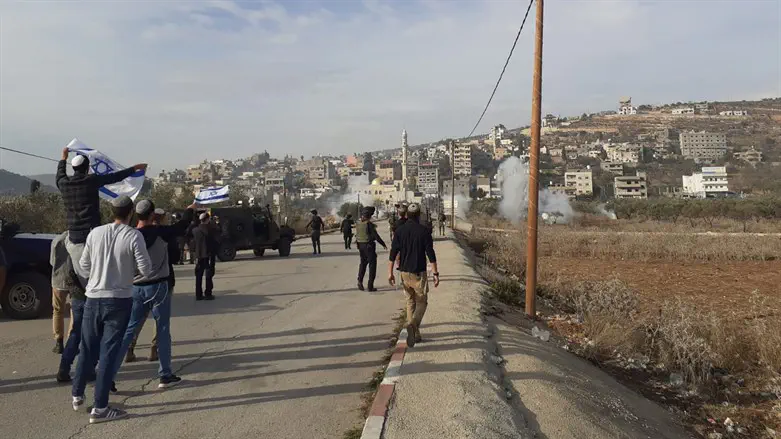
Residents of Eli and the surrounding area have grown tired of the rising number of stone-throwing attacks, especially on the main traffic arteries. This morning, the residents demonstrated at the entrance to the Arab town of Luban, from which schoolboys go out every morning to throw stones at Jewish vehicles.
Amichai Gurfinkel, a resident of Baruchin and one of the leaders of the protest, talks about the unbearable and life-threatening reality that has become routine there, which has been completely ignored by the media. The straw that broke the camel’s back and led to the decision to protest was the double incident in which his wife was hit by two barrages of stones at the same place and at the same time five days apart.
Gurfinkel says that for those who grew up in the settlement the stone-throwing became almost an integral part of their life routine. He said when his wife told him about the incident he responded with a sort of indifference that ‘this is how it is’, “stones are thrown all the time. I grew up with this.”
He also says that even when his wife came to her workplace and told about the stone-throwing when she was upset, she heard from her friend that she had also been pelted with stones just five minutes earlier and that her friend, who grew up in the settlement, did not think to report the incident to the hotline. “Neither we nor the media report until there is an injury, because otherwise it is not interesting. The army also ignores it until there is a serious injury,” Gurfinkel says.
According to Gurfinkel, the time has come for a change in attitude among the residents, the police, the IDF, and the government in order to prevent these attacks instead of waiting for someone to be seriously injured.
He said when he decided to look into things he found that the number of stone-throwing incidents was much higher than he had thought. As for the protest that the residents went to this morning, he says that the phenomenon of stone-throwing all over Judea and Samaria required a more meaningful and deeper solution, but the focus is on the village of Luban is because there is a relatively simple solution that the residents demand.
“Here the source of the threat is boys who go to schools in convoys, and on the way take a rock and throw it at a vehicle, especially after making sure it is a woman driving out since they believe that she will not go out to confront them with weapons. This road was built by the Civil Administration, and our request is to dismantle the road and move it into the village. There is no reason for these boys to cross the main road where Jewish drivers drive.”
Gurfinkel says that a dialogue with the various security forces exists, although at the moment the required response of moving the road into the village has not yet been received. In the coming days, representatives of the surrounding communities are expected to meet with the brigade commander and the division commander, to present the data and their demands.
The demonstration today began at 8 AM, after the students were already in their classrooms. The settlers arrived in their vehicles, and shortly afterwards villagers emerged and began throwing stones at them. Security forces separated the stone-throwers and the demonstrators, and an Arab riot continued even after the demonstrators left.

